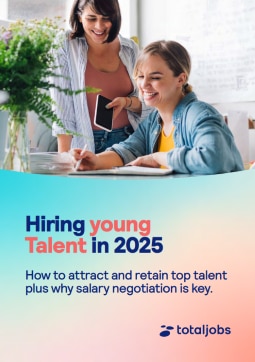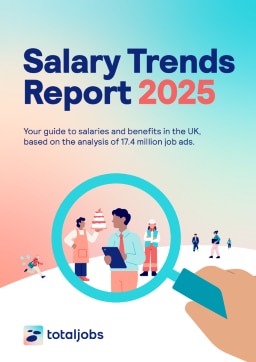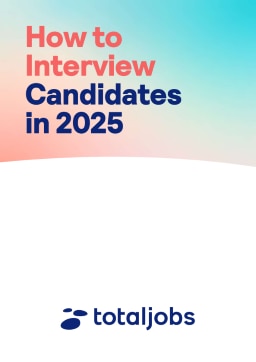
10 interview questions to ask young candidates in 2025
Table of Contents
- What matters most to young candidates?
- Growth, flexibility, and purpose are key
- The best interview questions
- Why interview questions matter

How to Attract and Retain Young Talent

How to Interview Candidates
Young professionals are redefining workplace expectations, leading employers to adapt hiring strategies to effectively attract and engage talent under-30.
According to our research, 44% of under-30s are looking for new job opportunities this year, driven by increasing demands for growth, transparency, and flexibility. To successfully connect with this demographic, employers may need to reconsider their approach and focus on what matters to young professionals.
In this article, we’re looking at interview questions for young candidates that can help you assess their priorities, suitability, and potential for long-term success.

Learn more about attracting and appealing to Gen Z candidates in our comprehensive guide.
What matters most to young candidates?
The expectations of young professionals are shaped by a generation that has grown up with fast access to information and rapid technological change. So, before we dive into the specific questions you should be asking in interviews, let’s explore some of the core motivators for young professionals during their job search.
Salary confidence has skyrocketed
Young candidates are well informed and assertive when it comes to salary expectations. We found that 89% of under-30s feel they know what they should be earning, and 71% are comfortable discussing salary with peers. Furthermore:
- 73% are confident negotiating their salaries
- 67% feel comfortable requesting a pay rise
As a result, employers must be prepared for direct discussions about pay during the recruitment process and aim to meet candidates’ expectations for transparency early on.

Ensure your compensation package hits the mark with our UK Salary Trends Report.
Growth, flexibility, and purpose are key
Young professionals are actively seeking roles that foster personal growth and work-life balance. Our data shows that 24% want more training and development opportunities, and 1 in 4 candidates look for a better work-life balance. Additionally, 63% report that they would consider accepting a lower salary in exchange for improved benefits, and could be tempted by:
- Flexible hours (44%)
- Additional time off (43%)
- Clear promotion pathways (41%)
By showcasing a commitment to development opportunities, purpose-driven work, and flexibility during the hiring process, employers can make their roles significantly more appealing to this generation of workers.
Transparency is increasingly important
With a rising emphasis on transparency, 65% of young candidates avoid applying for jobs that do not disclose salary information, while an overwhelming 87% want salary ranges included in job advertisements. Moreover, 88% want clarity regarding career progression and performance-based salary increases within their first year of employment. Therefore, transparency is not merely a desirable feature, it’s becoming an essential expectation for building trust between employers and young candidates.
The best interview questions to ask young candidates
As the talent landscape becomes increasingly competitive, interview strategies are vital to onboarding top young talent. The following questions are designed to tap into what matters most to today’s emerging professionals and to help hiring managers build trust, assess alignment, and create a more compelling candidate experience.

Take a deeper dive into the interview process with our free guide.
1. “What does an ideal role look like for you right now?”
This question can help understand a candidate’s priorities. Listen carefully to their responses regarding flexibility, learning opportunities, salary, stability, and purpose. The clarity with which candidates articulate their needs can also provide insights into their maturity and self-awareness. Assess their ability to communicate what they find most important and relate that back to what your role offers. Key priorities may include:
- Flexibility regarding hours and location
- Opportunities for learning and professional development
- Salary expectations
- Job stability and security
- Purpose and alignment with personal values
These conversations can help set the stage for later discussions about compensation, highlighting your willingness to accommodate their interests and showing that your organisation values their input.
2. “Where do you see yourself in 12–24 months, and how can we support you in getting there?”
Under-30s value opportunities for advancement, with 41% of young professionals looking for promotion opportunities within two years. This question helps assess their ambition and expectations for career progression, as well as whether your organisation’s pathway aligns with their vision. Pay attention to their level of thoughtfulness in their response.
- Look for strong responses that may include:
- Specific goals for professional growth
- Interest in new skills or roles
- Requests for mentorship or developmental experiences
Be prepared to explain the development structures you have in place, including mentorship, training, or potential projects, to create a compelling narrative that positions your workplace as a supportive environment for their growth.
3. “What kind of flexibility helps you do your best work?”
Flexibility in work hours and locations continues to be a priority among Gen Z candidates. Their responses to this type of question will indicate their preferences for autonomy, hybrid arrangements, or if they prefer a set structure, and can also show you how to best support them in the role. Being transparent about the flexibility your position offers, including any necessary boundaries, will provide clarity. This transparency fosters trust and prepares the ground for future discussions about compensation by illustrating that flexibility can sometimes compensate for other factors like base salary.
4. “What motivates you to go above and beyond at work?”
Identifying what drives a candidate is essential for gauging their potential for long-term engagement. Their motivations may revolve around recognition, purpose, team success, or personal growth. Each answer will provide valuable insights into how you can manage and support them effectively. Possible motivations may include:
- A desire for recognition and appreciation
- A commitment to meaningful work and purpose
- An inclination towards teamwork and collaboration
- A quest for personal and professional development
Share how your team collectively celebrates wins and fosters employee growth. This could also develop into conversations about performance metrics and how those tie into compensation reviews, as acknowledgment and rewards are crucial for engagement.
5. “Tell me about a project or achievement you’re proud of — and what made it meaningful to you.”
This question is designed to prompt candidates to reflect on their past experiences, offering a closer look at their values and how they take ownership of their work. Candidates who can articulate their contributions, whether it’s impact, problem-solving, creativity, or collaboration, are often those who understand the significance of their roles within larger contexts. Look for candidates to highlight:
- The specific impact of their contributions
- The challenges they overcame
- Lessons learned from the experience
Strong candidates should be able to connect their contributions to wider outcomes or learnings, reflecting a sense of accountability that is vital for team dynamics. This dialogue can pave the way for conversations about performance metrics and future goals, both of which are essential when discussing compensation and development pathways.
6. “Can you tell me about a time you received feedback — and how you responded?”
Responses to this question can uncover a candidate’s self-awareness, emotional maturity, and willingness to improve. Ideal responses will demonstrate openness to feedback and the ability to reflect on past experiences. By assessing how candidates have integrated feedback into their work, you can gauge their attitude towards learning and growth. You can then follow up by providing an overview of your feedback processes, as many candidates will be keen to understand how this impacts performance reviews and progression, which can also inform expectations around compensation.
7. “How do you define career success for yourself right now?”
Career success is subjective, but understanding candidate’s perspectives allows you to explore how your organisation’s offerings align with their expectations. Candidate’s definitions of career success could include:
- Achieving a satisfactory work-life balance
- Engaging in continuous learning and development
- Making a tangible impact in their role
- Attaining financial independence
You can then use their answers to position your opportunity effectively, illustrating how your organisation can help them achieve their definition of success. If, for example, a candidate articulates that work-life balance is a priority, you can explore how your existing culture supports this.
8. “What motivates you more: structure or autonomy, and why?”
Understanding a candidate’s preferred working style can help assess whether they will fit within your organisation. Their response will indicate how much freedom they need to thrive, and whether they would be better suited to a structured team or a more autonomous role. Consider factors such as:
- Comfort with guidance versus independence
- Need for regular check-ins or feedback
- Ability to work with minimal supervision
Try and be upfront about your team’s structure. If the role leans towards one trait, ensure the candidate can adapt accordingly.
9. “What would make you feel valued at work in your first 6 months?”
Candidate retention is heavily influenced by early engagement, making answers to this question particularly revealing. Understanding how candidates wish to be supported, whether through regular feedback, mentorship, or opportunities to take initiative, can help you plan how to offer the best possible introduction to your workplace. This also represents an opportunity to share relevant insights about your onboarding process and any recognition frameworks that cater to these needs. As you consider candidate responses, evaluate how your compensation structure acknowledges those elements, ensuring that new hires feel valued from day one.
10. “Do you have any questions for me about how pay, progression, or performance are handled here?”
Young candidates are increasingly focused on transparency, with 88% of under-30s seeking transparency around performance-based salary increases and career development. This question invites them to express any uncertainties or concerns regarding pay structures and performance review processes. Be prepared to answer confidently when candidates respond, as this is where many hiring processes falter. Demonstrating your organisation’s commitment to openness on these matters can build trust and reflect positively on your workplace culture. You can also use the dialogue here to reassure candidates about your commitment to fair compensation, encouraging ongoing discussions about their development and progression beyond the interview stage.
Why interview questions for young candidates’ matter
Young candidates are entering interviews with increased confidence and knowledge, and a strong focus on values. Over 60% of young jobseekers say they request higher salaries to leave room for negotiation while 89% are confident they know how much they should be paid.
By utilising questions like those outlined above in your interview process, you can engage in honest, two-way conversations concerning candidate expectations, including around compensation. This can help foster engagement, demonstrate your awareness and responsiveness to young candidate’s desires, and assist in assessing cultural alignment from the outset.
Explore articles
Receive the latest resources and advice to boost your hiring
By providing us with your details you agree to our privacy policy and for us to keep you updated with the latest news, events, and special offers from Totaljobs.






